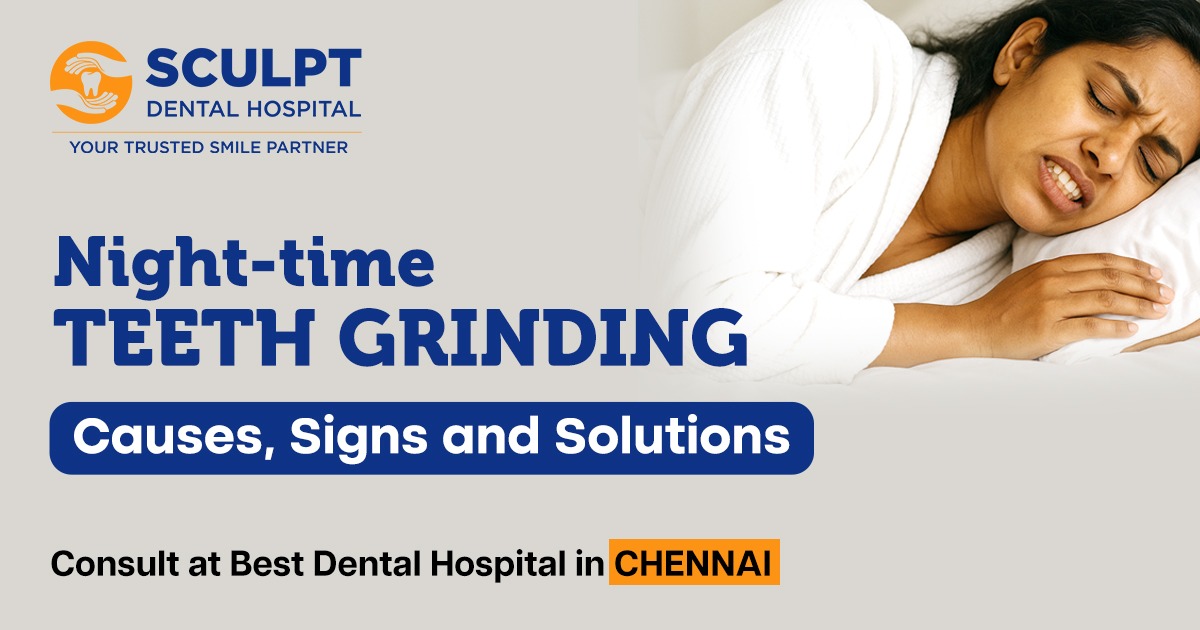
Waking up with sore jaws, headaches or chipped teeth could be more than a random issue; it may be a sign of night-time teeth grinding, also known as bruxism. Many people unknowingly clench or grind their teeth during sleep, leading to long-term damage to both teeth and jaw joints. The condition is common among adults and children and can be effectively managed with timely diagnosis and treatment. Seeking care at the Best Dental Hospital in Chennai ensures early intervention, personalized solutions and professional monitoring to protect your smile from lasting harm.
What Causes Night-time Teeth Grinding?
Teeth grinding can be triggered by several physical and emotional factors. Understanding these causes is essential for finding the right treatment.
Common causes include:
- Stress and anxiety: Mental tension often leads to unconscious clenching during sleep.
- Sleep disorders: Conditions like sleep apnea can trigger grinding episodes.
- Misaligned teeth: An improper bite forces the jaw to overcompensate.
- Lifestyle factors: Excess caffeine, alcohol or smoking increase muscle activity at night.
- Medications: Certain antidepressants and stimulants may contribute to bruxism.
Dentists at the Best Dental Hospital in Chennai often perform a thorough examination and sleep history analysis to identify the root cause before recommending a treatment plan.
What Are the Common Signs of Teeth Grinding?
Because grinding happens unconsciously during sleep, most people aren’t aware of it until symptoms appear.
Key warning signs include:
- Constant jaw tightness or pain upon waking.
- Worn-down or chipped teeth.
- Increased tooth sensitivity.
- Headaches, especially in the temples.
- Clicking or popping sounds from the jaw joint.
- Disturbed sleep for you or your partner.
If any of these symptoms sound familiar, visiting the Best Dental Hospital in Chennai can help confirm whether bruxism is the cause and prevent further dental wear or TMJ disorders.
What Happens If Teeth Grinding Is Left Untreated?
Ignoring the early signs of bruxism can lead to severe dental and muscular complications, such as:
- Tooth damage: Flattened or fractured teeth.
- Jaw disorders: Chronic pain, stiffness or limited movement.
- Gum recession: From excessive pressure on the roots.
- Sleep disruption: Reduced rest quality and fatigue.
- Facial discomfort: Pain spreading to the neck and shoulders.
Dentists at the Best Dental Hospital in Chennai stress that treating grinding early prevents long-term oral and joint deterioration.
What Are the Best Solutions for Night-time Teeth Grinding?
Effective treatment focuses on relieving muscle tension, protecting teeth and addressing the underlying cause.
1. Customized Night Guards
Wearing a dentist-designed mouthguard prevents enamel wear and reduces pressure on the jaw during sleep.
2. Stress Management Techniques
Yoga, meditation and controlled breathing can reduce anxiety-related grinding.
3. Corrective Dental Treatment
If malocclusion or bite misalignment is the cause orthodontic correction can eliminate the trigger.
4. Medication or Botox Therapy
In chronic cases, muscle relaxants or targeted injections may help reduce involuntary jaw contractions.
5. Lifestyle Adjustments
Limiting caffeine and alcohol, avoiding chewing gum and maintaining good sleep hygiene can dramatically reduce symptoms.
A team at the Best Dental Hospital in Chennai tailors each plan to the patient’s condition, ensuring comfort, safety and effective results.
Frequently Asked Questions (FAQs)
Is teeth grinding at night a serious condition?
Yes. If untreated, it can lead to enamel erosion, jaw pain and long-term dental complications.
How do I know if I grind my teeth in my sleep?
Common signs include morning headaches, worn teeth and jaw soreness. A dental evaluation can confirm it.
Can children also experience teeth grinding?
Yes. Many children grind teeth due to stress, allergies or misalignment. Most outgrow it, but monitoring helps prevent issues.
Do over-the-counter mouthguards help?
Store-bought guards may offer temporary relief but don’t fit perfectly. A custom night guard from your dentist is safer and more effective.
How long does it take to stop grinding teeth?
It depends on the cause and treatment consistency. With proper management from the Best Dental Hospital in Chennai, many patients experience relief within weeks.
Conclusion
Night-time teeth grinding may seem harmless at first, but over time it can severely impact dental health, comfort and sleep quality. Recognizing the early warning signs and seeking professional care is key to prevention. The Best Dental Hospital in Chennai offers advanced diagnostic tools, personalized night guards and stress-relief strategies to manage bruxism effectively. With expert guidance and a few lifestyle adjustments, you can protect your teeth, ease jaw tension and wake up refreshed every single day.
